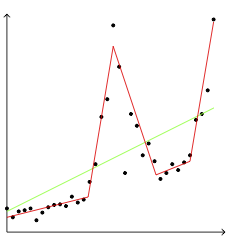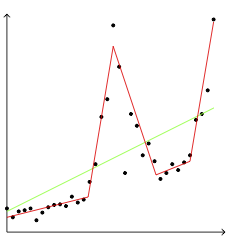A Bayesian Network (BN) is a probabilistic graphical model consisting of a directed acyclic graph (DAG), where each node is a random variable represented as a function of its parents. We present a novel approach capable of learning the global DAG structure of a BN and modelling linear and non-linear local relationships between variables. We achieve this by a combination of feature selection to reduce the search space for local relationships, and extending the widely used score-and-search approach to support modelling relationships between variables as Multivariate Adaptive Regression Splines (MARS). MARS are polynomial regression models represented as piecewise spline functions - this lets us model non-linear relationships without the risk of overfitting that a single polynomial regression model would bring. The combination allows us to learn relationships in all bnlearn benchmark instances within minutes and enables us to scale to networks of over a thousand nodes
翻译:Bayesian 网络(BN) 是一个概率图形模型,由定向循环图(DAG)组成,每个节点都是随机变量,作为父母的函数。我们展示了一种新的方法,能够学习BN的全球DAG结构,并模拟变量之间的线性和非线性本地关系。我们通过结合地物选择来做到这一点,以减少本地关系的搜索空间,并推广广泛使用的得分和研究方法,以支持变量之间的建模关系,如多变量的适应性反退性回退性螺旋(MARS) 。MARS是多元性回归性模型,代表成片状样样样样样功能。这让我们模拟非线性关系,而不会过度适应单一多面回归模型所带来的风险。这种组合使我们能够在几分钟内学习所有 bnlearn 基准实例中的关系,并使我们能够将超过1000个节点的网络进行缩放。






